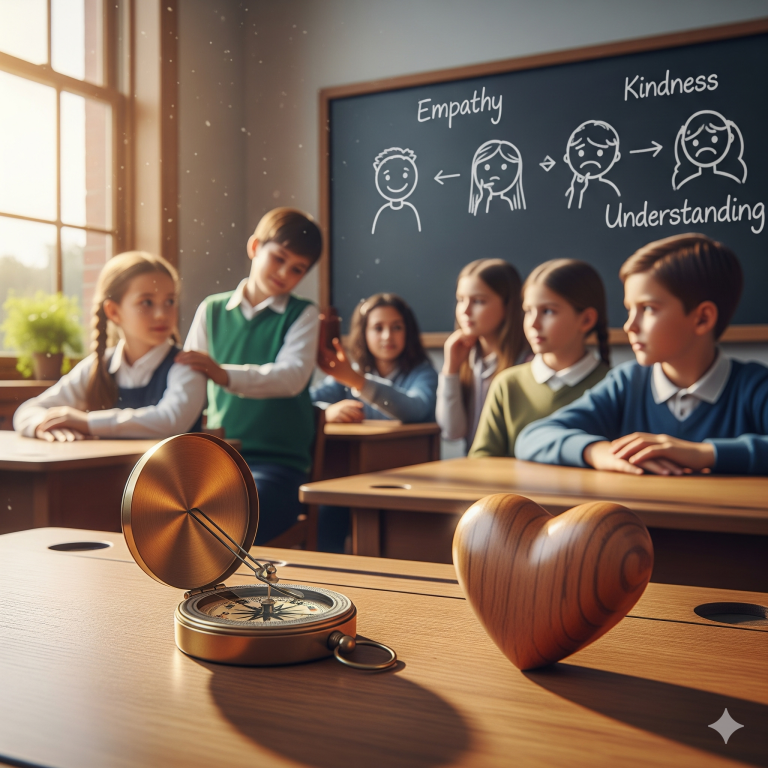
Emotional Intelligence
Building Stronger Minds: Why Schools Care About Emotions

Schools are starting to realize that emotions play a big role in how well students learn and grow. It’s not just about getting the right answers on tests—it’s also about how students feel and handle their emotions. When students learn to manage their feelings, they become better at focusing, problem-solving, and working with others.
Teaching emotional intelligence helps students understand their emotions, stay calm under pressure, and build strong relationships with their peers. This can make school a safer, happier place where kids are not only learning academic skills but also life skills.
When schools focus on emotions, they are helping students develop resilience, empathy, and confidence—skills that will serve them throughout their lives. Building stronger minds means supporting the emotional side of learning, so students are ready to face challenges and succeed, both in and out of the classroom.
More Than Tests: How Emotional Intelligence Is Shaping Education

Schools are starting to realize that education is about more than just grades and exams. Emotional intelligence (EI) is becoming a big part of how students are taught. EI is all about understanding and managing your emotions, as well as recognizing and respecting the feelings of others.
Teachers now focus on helping students build skills like empathy, self-control, and communication. These skills are important not only for learning but also for life. When students can handle stress, solve problems calmly, and work well with others, they’re more likely to succeed in school and beyond.
By including emotional intelligence in education, schools are helping kids grow into well-rounded individuals. This shift is showing that emotional skills are just as important as math or science, giving students a better chance to thrive in all areas of life, both personally and professionally.
Life Skills Matter: Teaching Kids How to Succeed Beyond the Classroom

Schools today are focusing on teaching kids important life skills, not just academic subjects. While grades are still important, learning how to handle challenges, communicate well, and manage emotions is crucial for success in the real world.
Life skills like problem-solving, teamwork, and time management help students become more independent and confident. These skills are often learned through group activities, discussions, and projects that encourage creativity and cooperation.
By focusing on life skills, schools are preparing students for the future in ways that go beyond what’s taught in textbooks. Whether it’s learning to deal with stress, being a good friend, or knowing how to set goals, these skills are essential for personal growth and success in any career.
In today’s world, it’s not just about knowing the facts, but also how to use them to build a happy, successful life.
Growing Confidence: Schools Helping Students Handle Life’s Challenges

Today, schools are focusing more on helping students build confidence and face life’s challenges. It’s not just about getting good grades anymore; it’s about teaching kids how to handle tough situations, stay positive, and keep going even when things get hard.
Through programs that focus on emotional intelligence, schools are helping students understand their feelings and deal with stress, anxiety, or failure. These lessons teach kids how to stay calm, ask for help, and bounce back from setbacks.
Teachers and counselors play a big role by creating a safe space where students can share their thoughts and feelings. This support helps build self-esteem, encourages problem-solving, and boosts confidence.
By focusing on life skills, like handling emotions, making decisions, and working with others, schools are preparing students for the real world. The goal is to help them grow into strong, confident individuals who can take on whatever challenges come their way.
Emotions in the Classroom: Why Schools Are Focusing on Feelings

In the past, schools mostly focused on grades and tests. But now, there’s a big shift toward understanding students’ emotions. Why? Because emotions play a huge role in learning. When students feel safe, understood, and supported, they are more likely to succeed.
Teachers are now being trained to recognize emotions in their students and help them manage stress, anxiety, or frustration. Schools are teaching kids how to express their feelings in healthy ways, communicate with others, and solve problems. This isn’t just about feeling good—it helps students focus better, work together, and build stronger relationships.
By focusing on emotions, schools are preparing students for life outside the classroom. Emotional intelligence is just as important as academic knowledge, and teaching kids how to manage their emotions will set them up for success, both in school and in their future careers.
Skills for Life: Preparing Kids for Real-World Success

Today’s schools are focusing more on teaching life skills, not just academic knowledge. While good grades are important, students need more to succeed in the real world. Schools are now helping kids develop skills like problem-solving, teamwork, communication, and emotional intelligence. These skills are crucial for handling everyday challenges, both in work and in life.
Life skills help students build confidence and resilience. They learn how to manage stress, handle disagreements, and make decisions. Schools are also encouraging creativity and adaptability, which are key in today’s fast-changing world.
By focusing on these skills, schools are preparing students for success beyond graduation. It’s not just about knowing math or science—it’s about being able to work well with others, think critically, and stay calm in tough situations. These skills will help kids thrive in whatever they choose to do in life.
Beyond the Report Card: What Really Matters in School

While grades are often seen as the main measure of success in school, there’s more to education than just scores. Schools are now focusing on helping students develop important life skills, like emotional intelligence, problem-solving, and teamwork. These skills help kids deal with challenges, build strong relationships, and grow into responsible adults.
Teachers are working to create a learning environment where students can express their feelings, understand others’ emotions, and learn how to handle stress. It’s not just about memorizing facts but about developing a mindset for lifelong learning and personal growth.
By focusing on emotional intelligence and life skills, schools are helping kids become well-rounded individuals who are prepared for the real world. After all, success isn’t just about acing tests—it’s about being able to communicate, collaborate, and face challenges with confidence. That’s what really matters in school.
Social Skills in School: How Emotional Growth Leads to Success

In today’s schools, learning isn’t just about math or reading—social skills are becoming just as important. Emotional growth helps students connect with others, work in teams, and understand their feelings and the feelings of others. These skills are essential for success in school and life.
When students can manage emotions like frustration or excitement, they become better at solving problems, handling stress, and making friends. Schools are teaching things like empathy, listening, and how to work together. These lessons help kids feel confident and comfortable in social situations.
As students grow emotionally, they develop stronger relationships with their peers and teachers. This leads to a positive classroom environment where everyone feels supported. In the long run, emotional growth helps students succeed not just in school but in their careers and personal lives too, as they learn how to communicate and work well with others.
Raising Resilient Kids: The Importance of Life Skills in Schools

In today’s world, it’s not enough for kids to just do well in school. Schools are now focusing on helping students build life skills that will make them stronger and more resilient in the future. These skills, like problem-solving, communication, and managing emotions, are essential for handling the ups and downs of life.
When students learn how to deal with stress, bounce back from failure, and work well with others, they become more confident and prepared for challenges. Life skills also help kids understand their feelings, make better decisions, and build positive relationships.
Schools are now teaching these skills alongside regular lessons, helping students grow into well-rounded individuals. By focusing on emotional intelligence and resilience, schools are giving kids the tools they need to face life’s challenges with a positive attitude and strong mindset. These skills will serve them well, both inside and outside the classroom.
Fostering Empathy: How Schools Are Teaching Emotional Intelligence

Schools are starting to recognize the importance of emotional intelligence (EQ) along with academic success. One key part of EQ is empathy—being able to understand and share the feelings of others. It helps students build better relationships and deal with challenges in a positive way.
To foster empathy, many schools are introducing activities like group discussions, role-playing, and mindfulness exercises. These activities encourage students to listen to each other, understand different perspectives, and practice kindness. Teachers also guide students in recognizing their own emotions and how to manage them effectively.
By focusing on empathy, schools are helping kids develop important life skills that go beyond grades. Students learn how to work together, resolve conflicts peacefully, and show compassion to others. These lessons help build a supportive school environment and prepare kids for the real world, where emotional understanding is just as important as knowledge.




